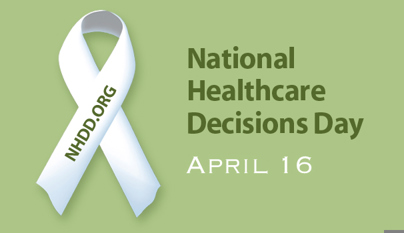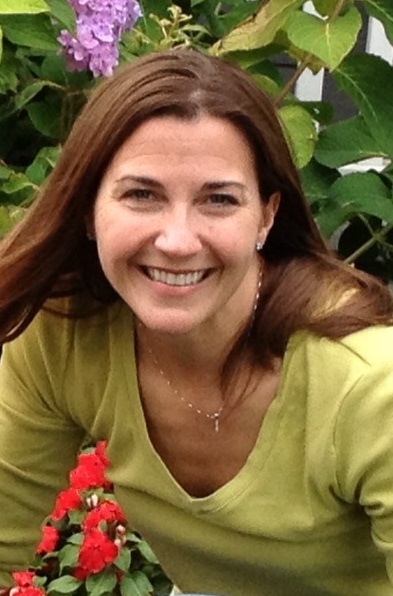National Healthcare Decisions Day
 National Healthcare Decisions Day is on April 16, the day after Tax Day. This is an important day that has been set aside to encourage people to ask themselves the question, “Who will speak for me if I cannot speak for myself?” National Healthcare Decisions Day is about taking the time to create an advanced directive for healthcare decisions. Advanced directives, like a Durable Power of Attorney for Health Care or a Living Will, offer an opportunity to document who would speak for you regarding health care decisions if you were unable to speak for yourself. This is also an opportunity to record specific instructions about end-of-life care and decisions. There is a lot to consider when drafting such documents. As a social worker in hospice, I have helped many people complete these forms. There are three main things I always encourage people to keep in mind when creating their advanced directives:
National Healthcare Decisions Day is on April 16, the day after Tax Day. This is an important day that has been set aside to encourage people to ask themselves the question, “Who will speak for me if I cannot speak for myself?” National Healthcare Decisions Day is about taking the time to create an advanced directive for healthcare decisions. Advanced directives, like a Durable Power of Attorney for Health Care or a Living Will, offer an opportunity to document who would speak for you regarding health care decisions if you were unable to speak for yourself. This is also an opportunity to record specific instructions about end-of-life care and decisions. There is a lot to consider when drafting such documents. As a social worker in hospice, I have helped many people complete these forms. There are three main things I always encourage people to keep in mind when creating their advanced directives:
- Be sure to carefully choose your representative. A sound choice for this person is not always a spouse, best friend or close relative. The choice needs to be someone who is strong enough to uphold your stated desires, even in the face of pressure from other people. Your chosen representative should be aware of your desires and should have the opportunity to discuss them with you and ask questions.
- Be as specific as possible when recording your wishes for your healthcare. These forms do not have to be basic. They can include as much detail as you would like regarding care as you near the end of your life. Most people think only about treatments they would like to have withheld. Instead, attempt to use the document as a way to ensure that your quality of life is maintained. I have seen living wills that include the directive to receive hospice care from a specific company, to have involvement from various alternative therapies (pet, music or aroma) and the wish to die at home if at all possible. All of these things are not considered outside of the scope of a good advanced directive.
- Be sure to share your document with others. This is imperative for ensuring that your instructions are known and followed. After completing an advanced directive, the goal is not to keep it private! Copies should be given to your medical providers. The representatives you name in the document should have a copy. It is a good idea to give copies to your family members who may be called upon if there was an emergency situation. There should also be a copy in the “important documents” file at your home. Beyond handing out the copies, you should take the time to review the document with your chosen representatives, family members and physicians. This may increase the chance that your wishes are recognized and your directives followed.
I encourage you, if you have not already, to use April 16 this year as a goal date to get your advanced directives completed, or at least as a starting date Waiting until you really need one is not the right time. You can get more information and blank forms at www.nhdd.org.
If online is easier for you, try MyDirectives.Com. Their easy-to-use program guides you through a series of questions to make your wishes known and allows you to upload your own messages.
Crossroads Hospice also has resources on our website, and we are sponsoring National Healthcare Decision Day events throughout the month of April. Join one near you or call us at 888-564-3405 with your questions.
Happy National Healthcare Decisions Day!
 |
Sherri Bickley, LMSW Emotional Support Services Consultant Crossroads Hospice |
If you found this information helpful, please share it with your network and community.
Copyright © 2015 Crossroads Hospice. All rights reserved.

